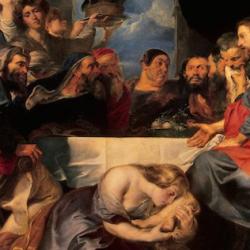The elder brother in the parable of the prodigal is a piece of work. He enjoys the abundance of his father’s house, and obviously also enjoys his father’s affection. Yet, he is simmering with bitterness and anger, which breaks to the surface as soon as he hears the sound of joy at his brother’s return. He refuses to call his father “father,” speaks of himself as a slave (DOULOO, “slaving away,” v 29), is so alienated from his father that what he wants most is a goat to celebrate with his “friends.” This is Jesus’ portrait of the Pharisees, busily “keeping” the commandments, but all the time simmering with resentment at the God whom they “slave” for. But it is not the father’s harshness that provokes the open display of bitterness; it is the father’s GENEROSITY and kindness, his desire to “comfort” his son (PARAKALEO, v 28; as in PARAKLETE) that provokes hatred.
I wonder too if this has anything to say concerning the “covenant of works” debate: Had Adam thought of his Edenic situation as a covenant of works, would he have thereby become an early type of the “elder brother”? The characterization of Adam’s original state purely as a state of “servanthood” before a Lord makes the same mistake as the elder brother. Adam was NEVER slaving a way for a Master; he was always , from the instant of his creation, a favored son, to whom his Father would say “all that is mine is yours.” It is even MORE apparent that Jesus’ description of the elder brother’s status applied to Israel. Surely, Israel was never in a “covenant of works,” never merely “servants,” but always Yahweh’s son, His firstborn.














